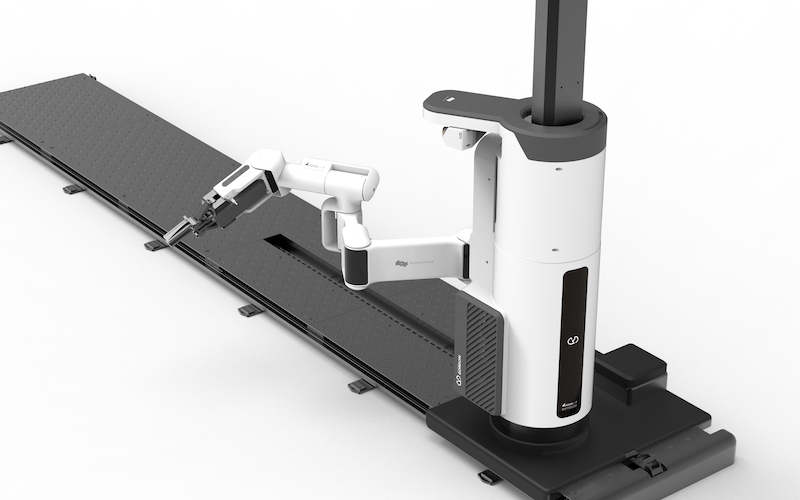Telexistence to install AI re-stocking robots in 300 convenience stores across Japan
Telexistence has started the mass production of its originally developed artificial intelligence robot, TX SCARA, to be installed in 300 FamilyMart stores, Japan’s top-tier convenience store chain in major metropolitan areas, starting later this month, validating its AI-based “robot-as-a-service” solution for grocery retailers.
TX SCARA was created to do the specific task of restocking refrigerated shelves with bottles and cans, a repetitive, tedious job generally performed by employees in often uncomfortable settings.
TX SCARA can be in operation 24/7, replenishing shelves at a pace of up to 1,000 bottles and cans per day, relying almost completely on its AI system – known as “GORDON” – to know when and where products need to be placed on the shelves.
The implementation of AI robots in FamilyMart stores will allow retailers to take advantage of the newly created time and economic “surplus” in the store environment. Retailers can focus on further improvements in the store environment for both employees and customers, as well as the profitability of each store.
Tomohiro Kano, general manager of store development department and railway and corporate franchisee department, of FamilyMart, says: “The decline in Japan’s labor population is one of the key management issues for FamilyMart to continue stable store operations.

“The introduction of Telexistence robots into FamilyMart stores will eliminate the need for store employees to replenish beverages in refrigerators, and the newly created time can be reallocated to customer service and shop floor enhancement, leading to higher quality store operations.”
Kano says: “We will continue to work with Telexistence to create a new way to operate stores.”
This initiative is a small step toward realizing Telexistence’s mission of improving all simple labor workflows in human society with robots. Telexistence is promoting this initiative based on a collaboration with Nvidia and Microsoft Japan. Specifically, NVIDIA GPU-accelerated AI technologies are embedded in hardware originally developed by Telexistence to provide AI and remote control of robots via Microsoft Azure platform.
Jin Tomioka, CEO of Telexistence, says: “Currently, the greatest limiting factor for any industry, in any nation, is human resources. Especially in developed countries like Japan, the shortage of human labor is rapidly becoming apparent in the retail and logistics industries, which support human life in society.
“We are promoting large-scale production and social implementation of our robots for industries other than factory automation, industries that function as the infrastructure for daily life in society. We also will bring our automated labor solutions to other regions, such as the United States.”
Tomioka adds: “Telexistence’s robots will become a powerful influence, providing a virtually inexhaustible supply of new labor. The new surplus resources will be appropriately redistributed through market mechanisms, and in the long run, this can lead to the transition of human society to be significantly augmented by automated labor.”
TX SCARA is autonomous with GORDON during normal operation. In rare cases where the AI encounters issues due to miscalculation or external factors such as an item falling or being out of place, remotely located Telexistence employees using VR glasses take control of the robot to correct issues across stores. Each TX SCARA can replace one to three hours every day of human work at a single store.
The market potential for TX SCARA is vast. In Japan alone, there are 16,000 FamilyMart convenience stores, plus approximately 40,000 more from other convenience store chains. Telexistence next plans to expand to convenience stores in the US, where more than half of consumers say they visit one of the country’s 150,000 convenience stores at least once a month.
Dr Lewis Pinault, Airbus Ventures partner based in Tokyo, says: “Moving from proof-of-concept to mass production of 300 remotely-operated robots with deep AI capabilities is a major step forward.
“As an early investor of Telexistence, we are thrilled to see the company’s diverse, richly talented team begin to take flight, rolling out their advanced technology across Japan and activating new channels in support of their future expansion in North America.”
Masataka Osaki, Japan country manager and VP of corporate sales, Nvidia: “Entire industries are transforming as customers build their next generation of robotics and edge AI applications on Nvidia platforms.
“Aiming to empower retailers to address labor shortages, Telexistence’s robotics solution, powered by Nvidia’s GPU-accelerated technologies, will enhance experiences for both retail customers and employees.”
Tomoko Mikami, managing executive officer, small medium and corporate business, Microsoft Japan, says:
“Microsoft Japan will be collaborating globally with Telexistence in terms of cloud platform and business development in the implementation of Artificial Intelligent Robotics for qualitative improvement of industry, as promoted by Telexistence.
“We are pleased that our platform can contribute to this project, and Microsoft will continue to support the project to make a significant impact not only in the Japanese market but also on a global scale.”

